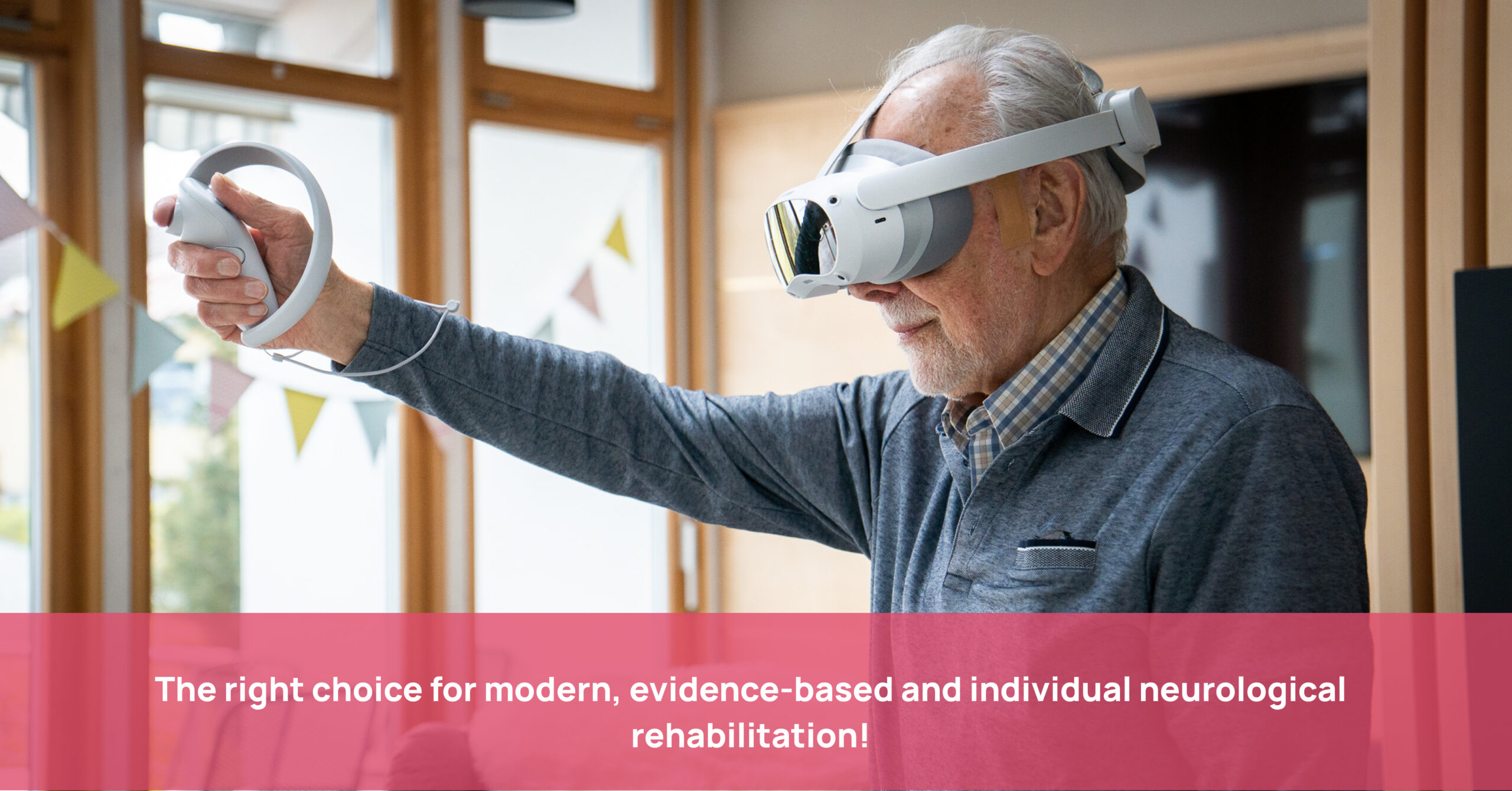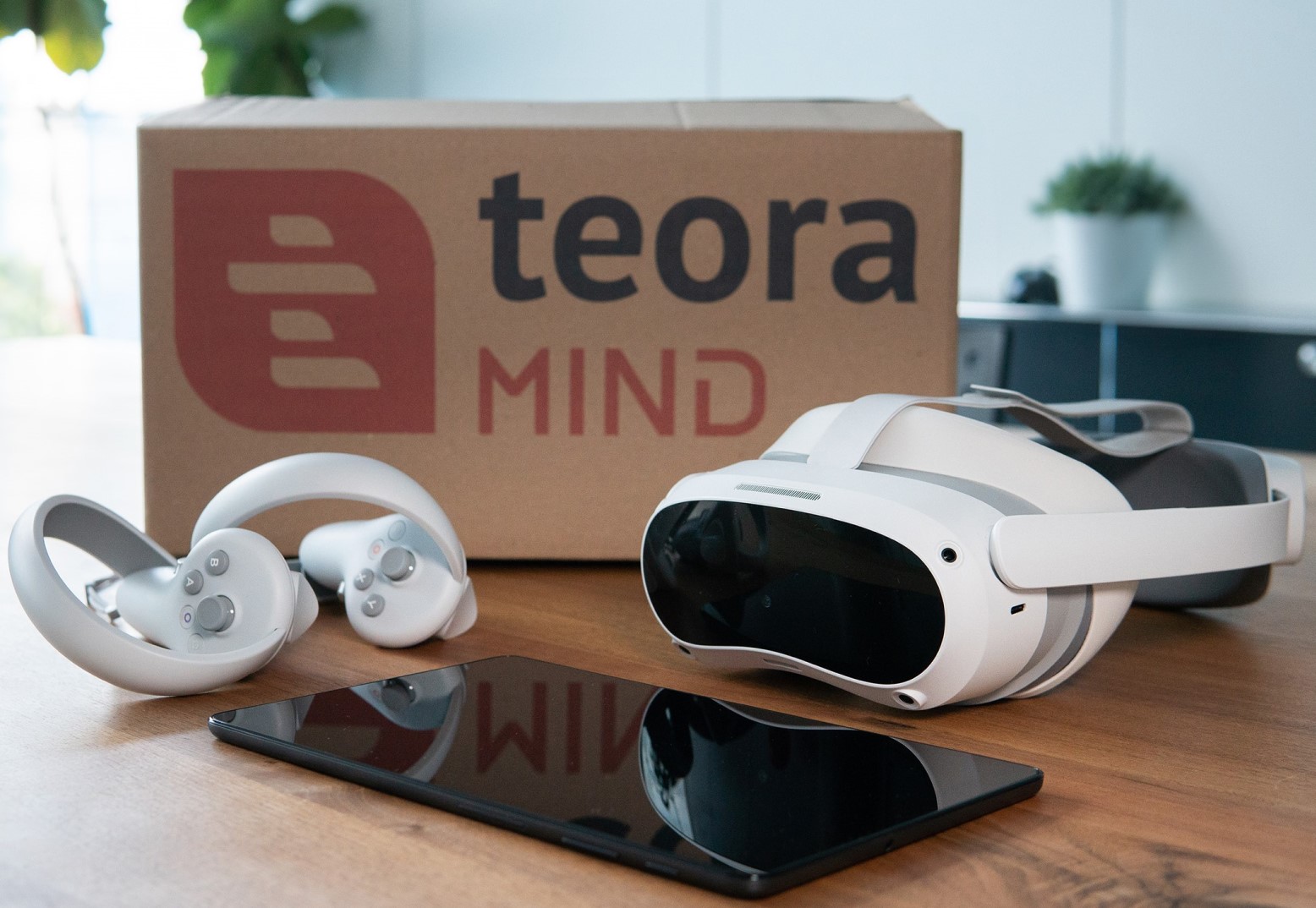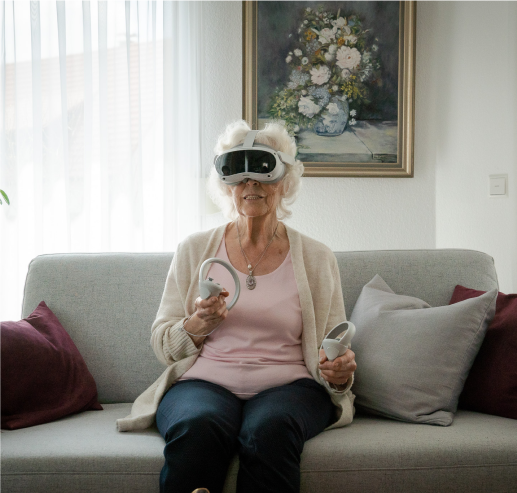
Everyday-based cognitive training with teora mind
teora mind is the first and only medical device approved under the MDR in the EU that can be used to treat cognitive deficits in neurorehabilitation. Our medical product is a therapy software that uses virtual reality to simulate everyday life in a playful and tangible way. Patients who suffer from difficulties with memory, attention or concentration often have problems that become apparent in everyday life. For this reason, teora mind focuses on these activities of daily living (ADL). In different scenarios, for example, coffee making, organizing the refrigerator or gardening can be practiced. teora mind enables you to train with those affected in a safe environment in situations that they encounter every day and actively prepare them for their return to everyday life.
Kitchen
Train attention, concentration and memory with your patients in various kitchen exercises:
- Putting away groceries
- Stocking the refrigerator
- Preparing fruit salad
- Making coffee
Garden
In our garden, your patients* exercise executive functions. First, action plan is created, which determines the order in which a plant, for example. planted, watered, fertilized and harvested. Subsequently, this planning will be implemented.
The number of planning steps varies according to the selected difficulty level
Beach shack
In addition to training memory and action planning, selling ice cream, cold drinks, or milkshakes in our beach shack will train you to handle money. Multi-level orders must be implemented correctly.
Relaxation room
In our relaxation room, your patients* can find peace in calming environments such as the rocky coast of Lanzarote or waterfalls in Iceland.
teora mind is study-tested
The teora mind therapy application is based on the latest scientific research findings and was developed together with practitioners and those affected in a practical way. In addition, we conduct our own studies. In a study, we have already found that virtual reality or treatment with it is well accepted by older adults in general, but also by stroke patients in particular. Regardless of any previous contact with virtual reality, the participants were able to find their way around teora mind after a short time.

teora mind exceeds the Gold Standard
In addition, the effectiveness of teora mind was compared with the current standard treatment in a randomized controlled trial. The current Gold Standard involves abstract exercises performed on a computer. Thereby e.g. Fish wearing a pearl selected or the steps to build a snowman put in the right order.
In the study, 42 stroke patients were randomized to receive standard therapy or were treated with teora mind. After 4-6 weeks of therapy with an average of 18.7 treatment sessions of 30-45 minutes, changes in cognitive skills were measured: The VR group achieved significant improvements in the areas of planning and problem solving. The control group with standard therapy showed no improvement. Both groups had the same baseline level.
The treatment was well received by both sufferers and treatment providers. No serious side effects were observed.
The study results suggest that VR training with teora mind is a safe and effective treatment option for patients with cognitive deficits.
Indications for teora mind
teora mind is used for people who are significantly restricted in their independence, self-determination or daily living skills due to cognitive deficits. These cognitive impairments are associated with diseases that affect the nervous system. This could be, for example strokes, Parkinson’s disease, mild cognitive impairment or traumatic brain injury.
If you would like to use teora mind beyond the areas of application defined by us, please contact us.

Components of the teora mind system
The teora mind therapy software is supplied together with the required hardware. Included in the overall system are:
- Mobile VR goggles (model: Pico 4) incl. two controllers. However, all exercises can also be performed one-handed.
- A therapy tablet (model: Samsung Galaxy Tab A), which allows therapists to monitor the training success of their patients in real time and configure the therapy plan accordingly.
The hardware is already prepared in such a way that it only needs to be switched on before training begins. No additional technical equipment is needed. Only a stable and password-protected W-LAN network needs to be provided. The Internet connection enables transmission from the VR goggles to the tablet of the person treating the patient.
Digital therapy support with teora platform
The teora platform web application included in the teora mind system enables you to accompany your patients beyond the therapy room. You can compile special exercises from teora mind into personalized therapy plans, evaluate training successes and make possible adjustments to the plan. It goes without saying that teora platform complies with the applicable data protection regulations.
teora mind In aftercare
Mobile VR glasses in combination with teora platform enable the expansion of the therapy offer from stationary use in the rehabilitation clinic to the living room at home. Independent of physical visits to the clinic or practice, the individual therapy plan can be accompanied virtually and the necessary therapy intensity can be guaranteed.
Your reasons for teora mind
Your advantages as a clinic
- Application of evidence-based therapy
- Everyday cognitive training of activities that are difficult to repeat, potentially dangerous, overwhelming, or difficult to control under real-world conditions
- Increased readiness for therapy and more motivated patients due to the playful character
- More efficient use of your staff due to the possibility of treating several patients in parallel
- Easy monitoring and documentation of therapy progress reduce your manual documentation effort
- Therapy possibility independent of location with the option of therapy support from a distance


The advantages for your patients
- Targeted training of the problems of daily life
- Simple and user-friendly application
- Higher therapy frequencies
- Higher motivation thanks to playfully processed content
- Flexible accompaniment and support
Your way to teora mind
We accompany you on your way from decision making to the therapy session with your patients

More information
In ourbrochure you will find all information summarized at a glance. Feel free to share them with your patients.
FAQ
Why does it make sense to use virtual reality for cognitive training?
Virtual reality can be used advantageously for rehabilitation in four ways. VR makes it possible to train potentially dangerous situations without actual danger. In addition, numerous activities that are difficult to repeat in everyday life can easily be performed several times in succession in virtual reality.Furthermore, virtual reality can be used regardless of location through the use of mobile technical devices. A large number of scientific publications suggest the use of VR for therapy and treatment of a wide variety of diseases. To find out more about this scientific basis, please read our "Studies" page continue.
Does virtual reality therapy have side effects?
When first using virtual reality, some people report mild nausea, mild headaches or mild dizziness. These symptoms are also called motion sickness. They sometimes occur when the vestibular organ and the eyes report two different signals to the brain. For example, the balance system "says" "We are not moving - we are sitting" and the eyes report "We are riding a roller coaster and moving forward very fast." This conflict between the eyes and the organ of balance can cause "confusion" in the brain and lead to nausea, dizziness or headaches.
To minimize the risk of motion sickness, we take care in each of our applications not to create conflicting signals between the eyes and the vestibular organ.
More detailed information about side effects can be found here in the Health and Safety Warnings of the VR headset manufacturer.
Is teora mind reimbursable?
teora mind has been reimbursable for fully insured persons of the INTER Insurance Group since 01.02.2024. If your patient is insured with another provider, please contact the relevant health insurance company for more information. In order to be reimbursable across the board in rehabilitation as well, we are also working on a model project in cooperation with the German Pension Insurance Fund.
What are the costs of the teora mind system?
The costs of our application vary depending on the number of VR glasses required and the contract term, among other things. Please contact us for more information.
For which rehabilitation phases is teora mind suitable?
teora mind can be used from rehabilitation phase C onwards.
What technical framework conditions must the clinic provide?
A password-protected, stable Wi-Fi connection is required to use teora mind. A guest network is not enough. We will provide you with all the technical aids that are required in addition.
